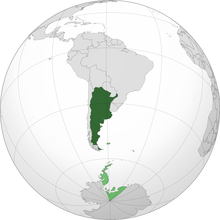"En unión y libertad" ("In Unity and Freedom") | |||||||
| Anthem | "Himno Nacional Argentino" | ||||||
| Capital (and largest city) |
Buenos Aires | ||||||
| Other cities | Cordoba, Rosario, Mendoza, La Plata, Santiago del Estero, Paraná, Santa Fe and others | ||||||
| Language official |
Spanish | ||||||
| others | Portughese, Italian, English, German, Guaraní, Quechua, Qom, Mocoví, Wichí and Welsh | ||||||
| Religion main |
Christianity | ||||||
| others | Atheism, Orthodoxy, Islam and others | ||||||
| Ethnic Groups main |
White or Mestizo | ||||||
| others | Amerindian, East Asian, African, American, Italian, Spanish, Portughese, French and others | ||||||
| Demonym | Argentinian, Argentine | ||||||
| Government | Federal presidential republic | ||||||
| Legislature | National Congress | ||||||
| President | |||||||
| Vice President | |||||||
| Area | 2,795,370 km² | ||||||
| Population | 40,117,096 | ||||||
| Established | 25 May 1810 with the May Revolution | ||||||
| Independence | from Kingdom of Spain | ||||||
| declared | 9 July 1816 | ||||||
| Currency | Argentine peso | ||||||
| Organizations | League of Nations and South American Confederation | ||||||
Argentina, officially the Argentine Republic (Spanish: República Argentina), is a country in the southern half of South America. Argentina covers an area of 2,780,400 km² (1,073,500 sq mi), making it the largest Spanish-speaking nation in the world by area. Is one of the founding members of the SAC. Argentina's continental area is between the Andes mountain range in the west and the Atlantic Ocean in the east. It borders Paraguay and Bolivia to the north, Uruguay and Brazil to the northeast, and Chile to the west and south. Its offshore territories include the Malvinas (the Falklands), and a few stations in Antarctica.
Argentina is among the few nations that escaped Doomsday virtually unscathed. Today it is one of the most prosperous nations in the world, boasting a large economy (both in absolute and per-capita terms), a high literacy rate, and an enviably high quality of life. Its days of military rule now past, Argentina enjoys some of the freest political and labor conditions in the world. As part of the economic powerhouse that South America has become, the nation is incredibly influential: one of the world's new great powers.
History[]
Pre-Doomsday[]
Prehistory in the present territory of Argentina began with the first human settlements on the southern tip of Patagonia around 13,000 years ago. The written history began with the arrival of Spanish chroniclers with the expedition of Juan Díaz de Solís in 1516 to Río de la Plata river, which marks the beginning of Spanish domination in this region. In 1776 the Spanish Crown established the Viceroyalty of the Río de la Plata, an umbrella of territories from which, with the Revolution of May 1810, began a process of gradual formation of several independent states, including one called the United Provinces of Río de la Plata. With the declaration of independence on July 9, 1816 and the military defeat of the Spanish Empire in 1824, a federal state was formed in 1853-1861, known today as the Republic of Argentina.
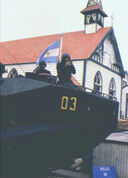
Amtrack during the invasion of the Falklands.
Ever since the re-establishment of British rule in 1833, Argentina has claimed sovereignty over the Falkland Islands. In pursuit of this claim, rejected by the islanders, Argentina invaded the Falkland Islands in 1982. This precipitated the two-month-long undeclared Falklands War between Argentina and the United Kingdom and resulted in the defeat and withdrawal of the Argentine forces.
Doomsday[]
Following Doomsday, Argentina suspended the presidential elections, originally scheduled for late October. President Reynaldo Bignone installed emergency measures to prevent chaos in Argentina. Though not directly hit, Argentina quickly began to experience the effects of the total collapse of the global economy and the changing weather patterns.
Meanwhile, bishops from Argentina joined their counterparts from across the region in Brasilia, Brazil to discuss the status of the Roman Catholic church in the Americas since contact was lost with the Vatican with the destruction of Rome.
Some of the first Doomsday refugees to arrive in Argentina were whaling and fishing vessels from Antarctica who after making the continent a temporary home for a few months during the winter they moved to warmer water after supplies dried up.
Mutual aid[]
In January of 1984, representatives from Argentina and Uruguay met in Buenos Aires to discuss how they could better combine their resources to get through the crisis caused by the economical and environmental damage of Doomsday. Despite some local opposition, the two military governments agreed to form a new, close alliance called the Bloque Unido Americano (United American Bloc or BUA), which would join their economic and foreign policies in a confederation. The Treaty of the Union was signed in La Plata city on March 20, 1984. Montevideo was chosen as the location of the alliance's secretariat to stave off fears that Uruguay would be swallowed by the more powerful Argentina.
The creation of the BUA marked the first post-Doomsday union of nations. Later unions, such as the Commonwealth of Australia and New Zealand and the Nordic Union would apply some of the lessons learned by the BUA.
Most British military forces in the Falkland Islands had already gone to defend the homeland from the Soviet invasion that they had believed to be imminent. Once the pact with Uruguay was concluded, Argentina's generals immediately ordered a new invasion to secure what they claimed was Argentine territory. The British could offer little resistance; they reluctantly agreed to evacuate the islands (along with any civilians who wish to join them). Most of the military sailed for Australia. A few Falklanders decided to make a stand on South Georgia Island. They lasted just a few years.
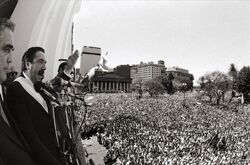
President Alfonsin in "Plaza de Mayo", Buenos Aires.
President Reynaldo Bignone expected that the twin successes of the creation of the BUA and the conquest of the Falklands would allow him to further extend his time in power. But popular opposition had been growing already in 1983, and these events failed to stop it. Most Argentines supported annexing the Falklands but recognized that with Britain incapacitated, it was no great feat. And the significance of the BUA only became apparent as the years went on. Therefore, Bignone was forced to stand down and call elections for November 1984. The election, widely considered free and fair, brought Raul Ricardo Alfonsín to the presidency for a five-year mandate.
South American Relations[]
During Alfonsin's presidency, Argentina tried to cultivate cooperation and goodwill among the surviving nations of Latin America. A Treaty of Peace and Friendship between Chile and Argentina, which resolve the Beagle Dispute, was signed later in 1985 by both governments. Argentine ships made many trips into North America to scavenge destroyed or abandoned American cities. The nation signed a free trade agreement with Mexico in 1988.
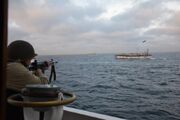
Argentine military in contact with a refugee vessel.
By the 1990s, Argentina was a leader in re-establishing diplomatic contacts with the rest of the world, including Oceania and Canada.
Internal History (1985 - 2003)[]
By 1985-1986, the economy had recovered considerably as result of the implemented measures and the consolidation of the democratic institutions continued advancing. The reduction of corruption in public offices, was an important achievement of Alfonsin's administration. The legislative elections realized on 1987 demonstrated continued public support for a strong and vigorous democratic system. At the end of his mandate, Alfonsin reduced the presidential term to four years.
In the election of 1989, the Governor of La Rioja, Carlos Menem (PJ) succeeded to Alfonsin as Head of State of Argentina. Menem continued with the expansion of national industries to replace the foreign imports, and signed some cooperation agreements with the countries of the Andean Union and Chile.
For 1993, the vice president Eduardo Duhalde won the nomination for be the candidate from the Justicialist Party in the presidential elections. He beat the opposition candidate with more of 55% of the votes. Meanwhile in the legislative elections, the PJ in alliance with other minor parties gained the majority on the Congress.
Recent History[]
In 2003, Argentina participated in an undeclared war with the Commonwealth of Australia and New Zealand over control of the Panama Canal Zone. Argentina was especially alarmed by the Australia-New Zealand superstate and the attack on Panama only confirmed the common assumption that the Commonwealth was merely the latest incarnation of the infamous Anglo-American imperialism. The incident galvanized President ___ to do something about the expansionist Anglos by suggesting to Brazil into going forward with plans for a military and economic alliance of the entire continent. Most of the continent was already united in two such unions: the Bloque (which now also included Paraguay) and the Andean Union. It was imperative, ___ argued, to combine these alliances and add Brazil and Chile, which as yet were unaffiliated. This would unite the whole continent under a strong union, especially the two powerhouses: Argentina and Brazil.
Diplomats and presidents met in May 2004, and on June 2 they declared the formation of the South American Confederation, merging the existing Andean Union into the structure. The status of the Panama Canal was one of the issues discussed at the first meeting. It was agreed that control of the Canal Zone would be handed to the SAC at a future date, but that Colombia, Venezuela and Ecuador, as the canal's builders, would have guaranteed seats on a five-seat commission to govern it. This model would later be adopted by the League of Nations for administering its international territories. In 2006, the headquarters of the SAC was moved to Montevideo, making the city the most important political center on the continent.
In 2005, Mauricio Macri was elected President of the United American Republic, and re-elected in 2009. He was instrumental in bringing Argentina into the multinational task force (which included the Celtic Alliance, Portugal, the Republic of Rif, País del Oro, and Chile) that expelled the Sicilians from the Strait of Gibraltar during the First Sicily War. The incident was an important turning point in Argentine history, marking its ascension as a major world power.
Economy[]
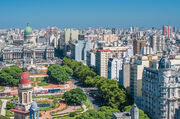
Central Buenos Aires.
Argentina is the third largest economy in the world and the second largest in South America, after Brazil. Its economy is a mix of manufacturing and agriculture. Several major corporations are headquartered in the nation, such as the automobile maker Fiat. The nation is now one of the foremost centres of world trade following the destruction of major centres such as London, New York and Tokyo. The nation has a World Trade Centre based in Buenos Aires, which is known as the BCBA.
Argentina imports most of its oil from Venezuela and natural gas from Bolivia, which is building a network of pipelines to supply them with the natural gas. Argentina also has its own oil deposits located in the south in the Patagonia region. The abundance of oil in the region was one of the main factors and causes of the Beagle Dispute with Chile.
In 2000, Argentina collaborated with Chile to create the first worldwide communication network accessible via computer terminals in public sites. Known as the "Red Mundial de Communicacion" (REMUNDO), or REM, the network is so far only accessible in South America though servers are being built in Oceania and other parts of the world. Nearly everyone involved with the REMUNDO/Internet agrees it has potential as a significant tool for commerce and social use, but that would require a global infrastructure, and speeds, which may not be available for the next ten to 20 years. The sentiment is that whatever extent REMUNDO develops will depend largely on funding and research from national governments and the League of Nations, as the private sector does not yet have the resources to develop the technology. The LoN has expressed an interest in growing REMUNDO, and the greatest technological breakthroughs are occurring especially in the the United American Republic. Investments brought to the the REM project has invigorated the Argentine economy.
Government & Politics[]
Administrative Divisions[]
Argentina's provinces are unchanged since 1983; its only territorial changes have been to the territories. It has 22 provinces, one autonomous city (Buenos Aires), and three territories (Tierra del Fuego, Antarctica, and the Malvinas).
Political parties[]
- National Front - Conservative ideology
- Colorado Party - Liberal, centric ideology
- Justicialist Party - South American nationalist party
- Socialist Party - Alliance of socialist parties. Member of the Socialist International.
International relations[]
Argentina is a member of the League of Nations and the South American Confederation.
Despite the Falkland Islands being a part of Argentina since 1984, the Dominion of South Africa has still asserted claims the islands along with the UK's other South Atlantic territories. This has made relations between the two nations tense. Argentina has been an outspoken critic of the DSA in the League of Nations. This animosity can be traced back to the pre-Doomsday Falkland War where the United Kingdom defeated Argentina.
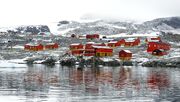
Esperanza Base, Argentine Antarctica.
Argentina is one of a few nations to claim territory on Antarctica and has built a research station there to enforce these claims. Argentine claims over Antarctica, as well as overlapping claims made by Chile and the United Kingdom, were suspended by the Antarctic Treaty of 1961. Following Doomsday, the treaty was ignored and nations have reopened claims to the continent.
Buenos Aires, Argentina is the location of Comando Central de Sudamérica of the WCRB.
Military[]
Argentina's military is heavily involved in peacekeeping efforts around the world and has seen action on at least five continents. The League of Nations actually reimburses the Argentine government due to the large amount of its military serving overseas.
Culture[]
Europeans[]
Argentina has a significant population of European nationals, who settled in the region before and after Doomsday.
Italians make up a specific portions of Europeans who settled in the Argentina. The Committee for the Establishment of a Southern State has a local chapter. The organization works to end Sicilian control of Southern Italy and to establish a democratic republican state there. The Committee was an important factor in bringing Argentina into the multinational union that retook Gibraltar in 2005 from Sicily.
Languages[]
Although Spanish is the official language, Italian and German - the latter especially due to an increasingly dominant German Diaspora - are slowly becoming major languages alongside it. The annexation of the Falkland Islands resulted in the departure of many English and the arrival of many Argentinians; but nobody was forcibly expelled, and English has continued as an unofficial language alongside Spanish. Though reduced to a minority, English speakers there are still afforded the courtesy of most printed material being in both Spanish and English. In addition to sub-titles on television and in movies, an English-speaking radio station continues to broadcast.
Sports[]
Association football, as in many other countries, is not only the most popular sport but deeply engrained into the culture. Argentina's World Cup victory in 1990, the first World Cup held since Doomsday, is fondly remembered by fans. Argentina made it to the quarter finals of the 2010 FIFA World Cup where they were defeated by Brazil.
Diego Maradona, the popular Argentine football star who is thought to have died on Doomsday while in Spain as a member of FC Barcelona [having been last seen in Barcelona on 24 September 1983], was declared the "honorary captain" of the 1990 national team. Popular folklore portrayed Maradona as the "Angel of the Albicelestes" who watched over and helped the team to victory.
The domestic league boasts some of the best clubs in the world outside of Brazil, including Boca Juniors, Independiente, Newell's Old Boys, Racing, River Plate and San Lorenzo de la Almagro.
Citizens enjoy and watch a variety of other sports, including basketball; Argentina has won the past three FIBA (Federation de Basketball Association) World titles.
Baseball is also popular in the country. The professional league attracts players as far away as the Dominican Republic.
Rugby union is growing in popularity and stature. Tennis, field hockey, motorsport, men's volleyball, polo and golf are widely played and watched as well.
Argentina is a member of the International Olympic Committee and participated in the 2010 Winter Olympics, the first Olympics held since Doomsday.
Education[]
Argentina is served by many of the finest universities in the world, including the National Technological University, the University of Buenos Aires, the National University of La Plata and the Universidad de Palermo (Buenos Aires).
See also[]
| ||||||||||||||
| ||||||||||||||||||||||



